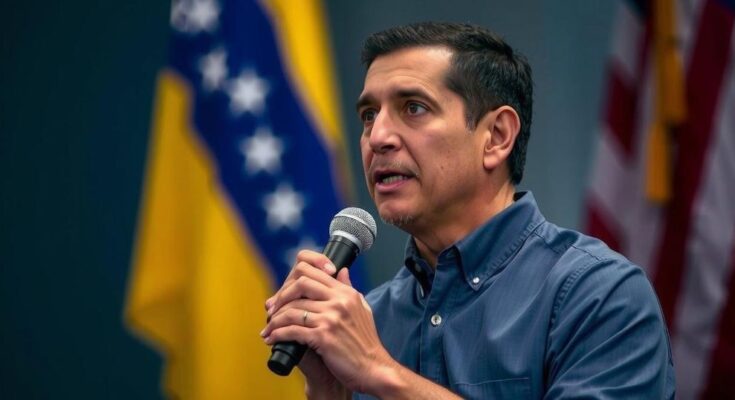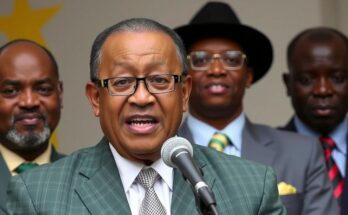The U.S. has recognized opposition candidate Edmundo Gonzalez as the president-elect of Venezuela after a disputed election that officially declared President Nicolas Maduro the winner. Secretary of State Antony Blinken emphasized the importance of respecting Venezuelan voters’ will, while international scrutiny continues over the election’s transparency and legitimacy.
The U.S. government has formally recognized Venezuelan opposition candidate Edmundo Gonzalez as the “president-elect” of Venezuela, months after President Nicolas Maduro announced his victory in a disputed election held in July. U.S. Secretary of State Antony Blinken made this announcement via social media, insisting on the necessity to respect the democratic will of the Venezuelan people. Despite the U.S. acknowledgment, the Maduro administration has dismissed claims of electoral fraud and has continued to stand by the results that declared Maduro as the victor shortly after the polls closed. Significantly, the Venezuelan National Electoral Council, packed with Maduro loyalists, has not released detailed election counts, raising questions about the transparency of the electoral process. The opposition coalition, however, claims to have gathered data from approximately 80% of the voting machines, indicating that Gonzalez received twice as many votes as Maduro. In response to Blinken’s recognition, Gonzalez expressed gratitude for acknowledging the wishes of the Venezuelan people and emphasized the desire for change within the nation. Following his departure from Venezuela for Spain amid an arrest warrant linked to the vote tally investigation, Gonzalez stated, “We deeply appreciate the recognition of the sovereign will of all Venezuelans.” Meanwhile, Venezuelan Foreign Minister Yvan Gil responded to the U.S. recognition with a personal critique of Blinken, suggesting he should reflect on his government’s failures rather than interfere in Venezuela’s internal affairs. Maduro has faced widespread international criticism for the lack of post-election openness, which has led to calls for a verification of results from various countries and organizations. Despite pressure from external parties, including the European Union and Colombia, Maduro’s regime has thus far refused to provide the detailed vote counts requested. Although U.N. observers determined the electoral authority’s results appeared untrustworthy, they did not affirm the opposition’s claim to authority following the election. In a shift of perspective, Colombian President Gustavo Petro, originally supportive of the July elections, publicly denounced them as a “mistake” during an interview. Petro’s change of heart illustrates the growing disapproval of the electoral conditions that have persisted in Venezuela. As the January 10 inauguration approaches for Maduro’s next term, the circumstances surrounding the election continue to draw scrutiny and criticism from multiple global actors.
The political landscape in Venezuela has been tumultuous, particularly following the July 28 election where President Nicolas Maduro was declared the winner amid accusations of electoral fraud and lack of transparency. The Venezuelan National Electoral Council, perceived as biased due to alignment with Maduro’s administration, limited the dissemination of vote counts. The opposition, spearheaded by Edmundo Gonzalez, has urged for recognition of what they claim was a legitimate electoral result. The international community, particularly the United States, has remained critical of the electoral process, demanding accountability and transparency from the Venezuelan government.
In summary, the U.S. government’s recent recognition of Edmundo Gonzalez as the president-elect of Venezuela highlights the ongoing tensions surrounding the legitimacy of the recent election results claimed by President Nicolas Maduro. The acknowledgment reflects a broader dissatisfaction with the electoral process characterized by a lack of transparency. As additional nations reassess their positions on the legitimacy of the election, the situation in Venezuela remains fraught with political discord, raising crucial questions about the future governance of the nation.
Original Source: www.voanews.com



